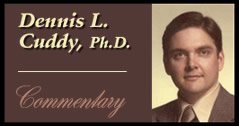A GUINEA PIG REMEMBERS
By
Dennis L. Cuddy, Ph.D.
March 7, 2011
NewsWithViews.com
The book, Educating for the New World Order by Bev Eakman, describes the psychological testing which has been done on American public school students over the past quarter century, and I would like to recount my own experience as one of the early “guinea pigs.” In 1963, the Carnegie Corporation gave $75,000 toward the first year ($225,000 over 3 years) of the North Carolina Governor’s School, which I attended. It was the first of its kind in the country, where TIME (June 28, 1963) said “Four hundred of North Carolina’s most brilliant and creative high school students have been brought together for an intensive eight-week (summer) study program.”
On May 6, 1963, Prof. George Welsh of the Department of Psychology at the University of North Carolina at Chapel Hill wrote to The Psychological Corporation of New York indicating that at the Governor’s School “we are planning to administer an extensive test battery including measures of aptitude, interest, and personality.” On May 10, Harold Seashore, director of the Corporation’s Test Division, replied to Prof. Welsh and indicated that if he used their test, “we would want a set of the cards filed with us, so that we can accumulate information on groups like this over the years.”
I have no way of knowing to what extent Prof. Welsh followed up on this, but it is interesting to note that The Psychological Corporation was founded in 1921 with Directors W.V. Bingham of the Carnegie Institute of Technology, J. McKeen Cattell as president of The Psychological Corporation, G. Stanley Hall of Clark University, Charles Judd of the University of Chicago, Lewis Terman of Stanford University, Edward Thorndike of Teachers College at Columbia University, James R. Angell as president of Yale University from 1921 to 1937, and others. Many of these Directors were the very psychologists who, along with John Dewey, gave us that disastrous “progressive” education that we have today. And in “The Psychological Corporation” (The Annals of the American Academy of Political and Social Science, November 1923), J. McKeen Cattell writes that “the Corporation is not so much concerned with arranging specific contracts for work by it or under its auspices, as in promoting the extension of applied psychology… To get the best kind of people and to put them in the situations in which they will behave in the way best for themselves and for others, is more fundamental than any other enterprize of society. It is necessary to organize means by which this work can be accomplished…. Psychology is concerned with the causes of conduct and its control.”
Though I do not know to what extent, if any, Prof. Welsh continued to communicate with The Psychological Corporation, I do know that he sent a memo to the Governor’s School administrative staff indicating “we can collect detailed information (about family and so on) later from those in whom we are seriously interested (in attending the school).” In a monograph published about the first 2 years of the school, there is a description of an objective “to attain increased self-realization for the individuals,” which uses words like those of Humanistic Psychology founder Abraham Maslow in his “hierarchy of needs.” The monograph also described that there would be studies of man’s beliefs and attitudes, the analysis of individual behavior (e.g., frustration, communality, conformity, philosophy, etc.), and an extensive battery of psychometric tests covering all the major areas of personality (e.g., value systems, emotional stability, etc.).
Terman’s Concept Mastery Test published by The Psychological Corporation was used (remember Lewis Terman was one of the original directors of The Psychological Corporation) as was the Allport-Vernon-Lindzey Study of Values test emphasizing key values such as “harmony” and religious “unity.” Among 4 other tests administered was Gough’s Adjective Check List where students would indicate whether they would describe themselves as cooperative or cruel or honest or despondent, etc. We were also given the Minnesota Multiphasic Personality Inventory (The MMPI, according to Prof. Welsh and E. Earl Baughman as co-authors of Personality: A Behavioral Science, had its original purpose in the late 1930s and early 1940s “to afford an objective assessment of some of the major personality characteristics related to psychiatric disability”) published by The Psychological Corporation. In this latter test, we were asked to respond “true” or “false” to 771 statements, among which were the following 10:
1) I believe in the worth of humanity, but not in God.
2) We cannot know for sure whether or not there is a God.
3) One of the most important things children should learn is when to disobey authorities.
4) The best philosophy is to eat, drink, and be merry, for tomorrow we die.
5) In illegitimate pregnancies abortion is in many cases the most reasonable alternative.
6) Divorce is often justified.
7) The findings of science may some day show that many of our most cherished beliefs are wrong.
8) Most of our social problems could be solved if we could somehow get rid of the immoral, crooked, and feeble-minded people.
9) Organized religion, while sincere and constructive in its aims, is really an obstacle to human progress.
10) The only meaning to existence is the one which man gives himself.
There was another statement on this test, “Nowadays more and more people are prying into matters that should remain personal and private,” to which I might well have answered, “Yes, like those administering this test.”
Modeled after the North Carolina’s Governor’s School, the Arkansas Governor’s School was founded in 1979 and overseen by appointees of Bill Clinton. According to Peter LaBarbera in Human Events (September 12, 1992), the Arkansas Governor’s School has had the following activities: “A blatant anti-Christian diatribe from a radical feminist ‘witch’ who likens Jesus Christ’s death on the cross to necrophilia and sado-masochism; pro-homosexual readings, discussions, and films like ‘The Times of Harvey Milk’—a film lionizing homosexual San Francisco supervisor Harvey Milk; a lecture from the attorney who defended ‘Jane Roe’ in the Roe v. Wade Supreme Court case concerning abortion (with no balancing speaker from the pro-life side); and a lesson in ‘animal liberation’ from a representative of People for the Ethical Treatment of Animals (PETA), a rabid ‘animal right’s’ whose leader has compared chicken harvesting to the Holocaust."
|
|
Mark Lowery, who formerly served as publicity director for the Arkansas Governor’s School, revealed that at the Governor’s School: “…They’re trying to mold students’ minds in this more liberal, humanistic thinking…. They’re trying to move ultimately into ‘political correctness.’… Parents need to know their children are being brainwashed…. I would call it indoctrination…. It’s something that’s well-orchestrated, well-organized, mind-bending and manipulative…. It tears down authority figures…. Renowned writer Ellen Gilchrist spoke to the students and was quoted as saying, ‘Students, do me a favor and totally ignore your parents.’… There’s collusion throughout all areas to try and help develop a belief that there are no absolutes…. It was an attack upon Christianity, but more so it was an attack upon conservative thought…. The students were told that they’re an elite who will not be understood by their parents, because the students have been treated to thought their parents can’t handle.” A parent of a student at the Governor’s School related that the children weren’t allowed to go home except on July 4 weekends, and were discouraged from having any contact (e.g., by telephone) with the outside world. The parent also explained how her child’s values were changed at the school, and her son committed suicide within a year.
© 2011 Dennis Cuddy - All Rights Reserved












 Share
This Article
Share
This Article





